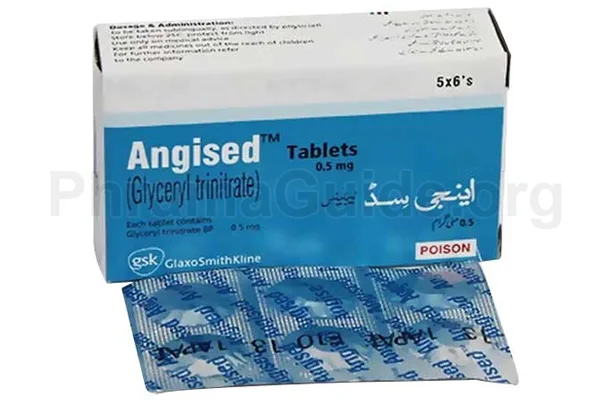Angised tablet is primarily used to treat cardio-related problems such as angina and heart failure. It increases the blood flow and reduces the workload on the heart. Following are some common uses of Angised Tablet:
- Angina: Angised tablet is primarily used to treat angina, a type of chest pain caused by reduced blood flow to the heart.
- Heart Failure: In some cases, Angised tablets may be used to treat heart failure by reducing the workload on the heart and improving blood flow.
- Acute Myocardial Infarction: Angised tablets may be used to treat acute myocardial infarction (heart attack) by reducing the workload on the heart and improving blood flow.
- Hypertension: In certain situations, Angised tablets may be used to treat high blood pressure (hypertension), such as during surgery or in emergency settings.
Off-label Uses of Angised Tablet
- Angised tablets are also used to treat Erectile dysfunction in some cases. Although it is an off-label indication to use Angised tablets.

What is Angised?
Angised is one of the leading brands of Glyceryl Trinitrate (also known as Nitroglycerin), manufactured and marketed by GlaxoSmithKline (GSK).
Angised Alternatives : Other Similar Brands
The following are some alternative brands of Angised and their manufacturers.
- Sustac : Searle Pakistan (Pvt) Ltd.
- Cardnit : Atco Laboratories Ltd, Pakistan.
- Nitromint Retard : Medimpex Scientific Office, Pakistan.
- Nitroscot : Scotmann Pharmaceuticals, Pakistan.
- Angiocard : Biogenics Pakistan (Pvt) Ltd.
- Angilingual : Zafa Pharmaceutical Laboratories (Pvt) Ltd, Pakistan.
- Glyrate SR : Getz Pharmaceuticals (Pvt) Ltd, Pakistan.
- Anginor : Werrick Pharmaceuticals, Pakistan.
- Nitrocid : Ferozsons Laboratories Ltd, Pakistan.
- Cornit : Valor Pharmaceuticals, Pakistan.
Angised : Available Formulations and Strengths
Presently, Angised is available in Tablet Form.
Angised Tablet : 0.5mg strength.
Who Should Not Use Angised?
Angised is a prescription medication and should not use under the following conditions:
Hypersensitivity: Angised should not be used in individuals who are hypersensitive to it or any of its components.
Severe Anemia: Angised should not be used in individuals with severe anemia, which is a condition characterized by a low number of red blood cells.
Head Injury: Angised should not be used in individuals with head injuries, as it can increase intracranial pressure and worsen the injury.
Glaucoma: Angised should not be used in individuals with glaucoma, as it can increase intraocular pressure and worsen the condition.
Erectile Dysfunction Drugs: Angised should not be used in combination with drugs used to treat erectile dysfunction, such as sildenafil (Viagra), tadalafil (Cialis), or vardenafil (Levitra), as this can cause a potentially life-threatening drop in blood pressure.
Use of Riociguat: Angised should not be used in combination with the drug riociguat, as this can cause a potentially life-threatening drop in blood pressure.
What is the Recommended Daily Dosage of Angised?
The usual starting dose of Angised is 1 tablet placed under the tongue or in the buccal pouch at the first sign of an angina attack. If symptoms persist after 5 minutes, a second dose can be taken. The maximum daily dose of Angised is typically 3 to 6 mg, taken in divided doses as needed.
How Angised Works?
Angised is a vasodilator, which means it works by relaxing the smooth muscle in the walls of blood vessels, allowing them to widen and increase blood flow. It does this by releasing nitric oxide in the blood vessels, which in turn activates an enzyme called guanylate cyclase. Guanylate cyclase then increases the production of cyclic guanosine monophosphate (cGMP), a chemical that relaxes the smooth muscle cells in blood vessels and increases blood flow.
Angised also dilates the coronary arteries, which are the blood vessels that supply the heart muscle with oxygen and nutrients. By dilating these arteries, Angised can increase blood flow to the heart, relieving the symptoms of angina.

Leave A Comment